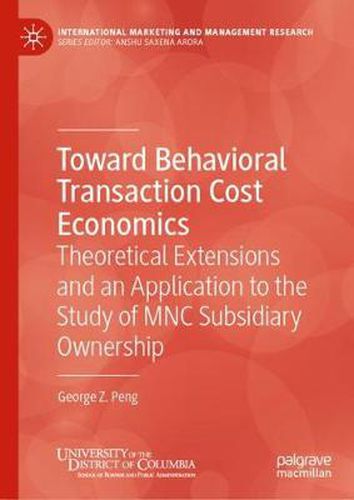Readings Newsletter
Become a Readings Member to make your shopping experience even easier.
Sign in or sign up for free!
You’re not far away from qualifying for FREE standard shipping within Australia
You’ve qualified for FREE standard shipping within Australia
The cart is loading…






This title is printed to order. This book may have been self-published. If so, we cannot guarantee the quality of the content. In the main most books will have gone through the editing process however some may not. We therefore suggest that you be aware of this before ordering this book. If in doubt check either the author or publisher’s details as we are unable to accept any returns unless they are faulty. Please contact us if you have any questions.
Adopting a critical realist position, this book renders transaction cost economics (TCE) into a behavioral theory of organizational decision-making by foregrounding psychological processes and introducing and integrating with effectuation theory. Consistent with its behavioral agenda, the book introduces the concept of uncertainty controllability and provides a clearer conceptualization and a novel modeling strategy of bounded rationality based on the conceptual separation of cognitive bounds from psychological ‘rationalizing.’ The book inspires new insights into the significance of cultural distance (CD). Based on the understanding that culture is socially-extended cognition, the author re-conceptualizes CD as reflecting cognitive bounds, and uses the biases arising from CD to contextualize effectuation and deepen the flat ontology of both TCE and effectuation theory.
The book presents a full two-sided behavioral framework of organizational decision-making, with behavioral TCE and behavioral real options theory complementing each other to complete the full behavioral picture. Both sides are further linked to organizational learning, which reduces biases over time and thus drives governance structures toward more rational directions. The full framework uses prospect theory as the overarching theory that determines which side of the behavioral framework is relevant for the uncertainty of concern based on the different problem frames resulting from different degrees of uncertainty controllability. Because effectuation can take place on both sides of the framework based on competing risk logics, prospect theory serves to harmonize inconsistencies in the effectuation literature as a side note.
This book applies the behavioral TCE side of the framework to the study of MNC subsidiary ownership decision-making process using a dataset of over 10,000 Japanese subsidiaries founded in 43 host countries. It concludes with a discussion of implications and future directions for TCE in general and international business in particular.
$9.00 standard shipping within Australia
FREE standard shipping within Australia for orders over $100.00
Express & International shipping calculated at checkout
This title is printed to order. This book may have been self-published. If so, we cannot guarantee the quality of the content. In the main most books will have gone through the editing process however some may not. We therefore suggest that you be aware of this before ordering this book. If in doubt check either the author or publisher’s details as we are unable to accept any returns unless they are faulty. Please contact us if you have any questions.
Adopting a critical realist position, this book renders transaction cost economics (TCE) into a behavioral theory of organizational decision-making by foregrounding psychological processes and introducing and integrating with effectuation theory. Consistent with its behavioral agenda, the book introduces the concept of uncertainty controllability and provides a clearer conceptualization and a novel modeling strategy of bounded rationality based on the conceptual separation of cognitive bounds from psychological ‘rationalizing.’ The book inspires new insights into the significance of cultural distance (CD). Based on the understanding that culture is socially-extended cognition, the author re-conceptualizes CD as reflecting cognitive bounds, and uses the biases arising from CD to contextualize effectuation and deepen the flat ontology of both TCE and effectuation theory.
The book presents a full two-sided behavioral framework of organizational decision-making, with behavioral TCE and behavioral real options theory complementing each other to complete the full behavioral picture. Both sides are further linked to organizational learning, which reduces biases over time and thus drives governance structures toward more rational directions. The full framework uses prospect theory as the overarching theory that determines which side of the behavioral framework is relevant for the uncertainty of concern based on the different problem frames resulting from different degrees of uncertainty controllability. Because effectuation can take place on both sides of the framework based on competing risk logics, prospect theory serves to harmonize inconsistencies in the effectuation literature as a side note.
This book applies the behavioral TCE side of the framework to the study of MNC subsidiary ownership decision-making process using a dataset of over 10,000 Japanese subsidiaries founded in 43 host countries. It concludes with a discussion of implications and future directions for TCE in general and international business in particular.